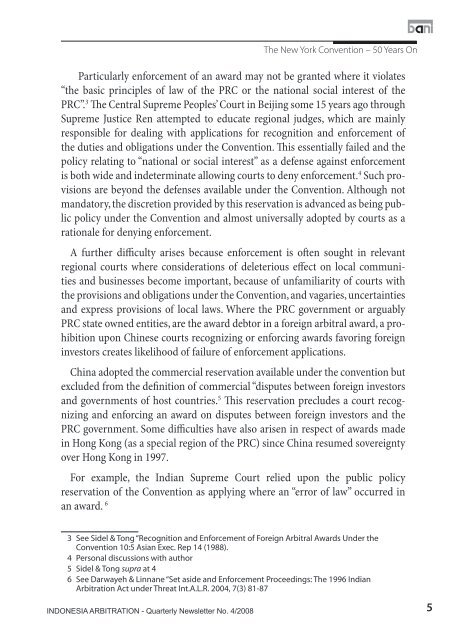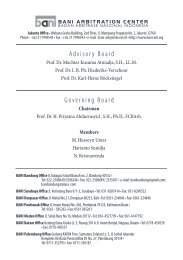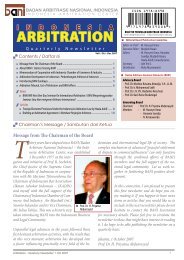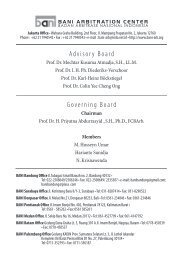indonesia arbitration - Bani
indonesia arbitration - Bani
indonesia arbitration - Bani
You also want an ePaper? Increase the reach of your titles
YUMPU automatically turns print PDFs into web optimized ePapers that Google loves.
Particularly enforcement of an award may not be granted where it violates<br />
“the basic principles of law of the PRC or the national social interest of the<br />
PRC”. The Central Supreme Peoples’ Court in Beijing some 15 years ago through<br />
Supreme Justice Ren attempted to educate regional judges, which are mainly<br />
responsible for dealing with applications for recognition and enforcement of<br />
the duties and obligations under the Convention. This essentially failed and the<br />
policy relating to “national or social interest” as a defense against enforcement<br />
is both wide and indeterminate allowing courts to deny enforcement. 4 Such provisions<br />
are beyond the defenses available under the Convention. Although not<br />
mandatory, the discretion provided by this reservation is advanced as being public<br />
policy under the Convention and almost universally adopted by courts as a<br />
rationale for denying enforcement.<br />
A further difficulty arises because enforcement is often sought in relevant<br />
regional courts where considerations of deleterious effect on local communities<br />
and businesses become important, because of unfamiliarity of courts with<br />
the provisions and obligations under the Convention, and vagaries, uncertainties<br />
and express provisions of local laws. Where the PRC government or arguably<br />
PRC state owned entities, are the award debtor in a foreign arbitral award, a prohibition<br />
upon Chinese courts recognizing or enforcing awards favoring foreign<br />
investors creates likelihood of failure of enforcement applications.<br />
China adopted the commercial reservation available under the convention but<br />
excluded from the definition of commercial “disputes between foreign investors<br />
and governments of host countries. 5 This reservation precludes a court recognizing<br />
and enforcing an award on disputes between foreign investors and the<br />
PRC government. Some difficulties have also arisen in respect of awards made<br />
in Hong Kong (as a special region of the PRC) since China resumed sovereignty<br />
over Hong Kong in 1997.<br />
For example, the Indian Supreme Court relied upon the public policy<br />
reservation of the Convention as applying where an “error of law” occurred in<br />
an award.<br />
See Sidel & Tong “Recognition and Enforcement of Foreign Arbitral Awards Under the<br />
Convention 0:5 Asian Exec. Rep 4 ( 988).<br />
4 Personal discussions with author<br />
5 Sidel & Tong supra at 4<br />
6 See Darwayeh & Linnane “Set aside and Enforcement Proceedings: The 996 Indian<br />
Arbitration Act under Threat Int.A.L.R. 2004, 7( ) 8 -87<br />
INDONESIA ARBITRATION - Quarterly Newsletter No. 4/2008<br />
The New York Convention – 50 Years On







